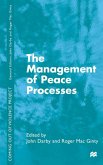Tired of American news coverage that frames the causeof the Israeli-Palestinian conflict as Palestinian terrorism andsituates Israeli violence as a defensive response, activists in the U.S. andaround the globe formed Palestine Media Watch in September 2000. ByOctober 2000 Palestine Media Watch was monitoring and lobbyingU.S. newspapers and networks all across the country, imploringAmerican journalists to frame the conflict from the perspective ofinternational law: Israel's occupation of the Palestinian territories is illegal,so Palestinian violence should be framed as a response to the occupation. This study examines activist strategies and journalisticresponses to those strategies between 2000 and 2004 -- the yearsactivists were most active -- to examine what can and cannot beaccomplished by dissident media monitoring and to show howprofessional journalism practices make change possible but also subvert it.
Bitte wählen Sie Ihr Anliegen aus.
Rechnungen
Retourenschein anfordern
Bestellstatus
Storno








